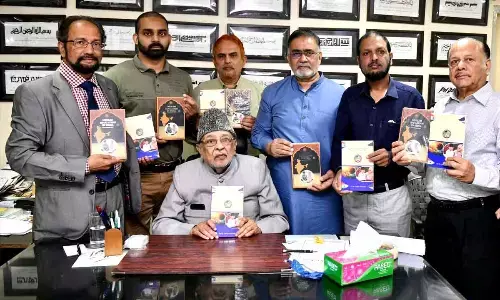CBSE Hubs of Learning to give fillip to innovation

The Central Board of Secondary Education (CBSE) has decided to form Hubs of Learning (HoL) from July this year in a bid to improve the quality of education and to promote self-improvement.
Hyderabad: The Central Board of Secondary Education (CBSE) has decided to form Hubs of Learning (HoL) from July this year in a bid to improve the quality of education and to promote self-improvement.
Taking a series of initiatives introduced during the academic year 2018-19 forward the Board wanted its affiliated schools to form HoLs from the academic year 2019-20, starting from July 2019. Terming the new initiative is intended to make its affiliated schools future ready the CBSE wanted all of its affiliated schools to actively participate in the new initiative to ensure "quality education, adoption of innovative pedagogies, such as, experiential and active learning, focus on skills, art and sports, capacity building of teachers, and holistic development of the child through life-skills and value-based education," it said.
Accordingly, groups of four to six neighbourhood schools should form into an HoL for collaborative growth. The main aim of this collaborative partnership between schools is to create an ecosystem for the schools to effectively take up all-round self-improvement.
The Board said that the collaboration will allow not only exposure to best practices but also the possibility of adaptation or even replication of these practices. It is expected that school leadership would assume greater responsibility towards improving the quality of their school and also extend their support to neighbourhood schools. All schools in a given group are expected to be "givers" as well as "receivers" of support, fresh ideas, resources, opportunities for student learning, opportunities for teacher learning, other joint activities, etc.
The Board is of the view that there is as much to learn from a small school with fewer resources as from a large school with several resources. Under this new initiative, the HoL schools would initiate academic collaboration, systemic reforms, building a sense of community to overcome isolation, professional development of teachers and staff and resource sharing. On its part, the Board will identify members for each hub form amongst 4-6 neighbouring schools in a district, preferably in the same city, as far as possible and for the CBSE schools located abroad, it would make efforts to group them with HoL in Delhi. As part of the objectives, each group would be assigned a unique number which shall be based on state, district and city code. Wherever the schools in an identified hub are not located in the same city, and if frequent real-time meetings are not possible, then, the schools can do virtual meetings and programmes, with the use of IT tools such as Skype, etc.
One among the participating schools in the HoL will be nominated as the Lead Collaborator School (LCS) by the Board on the basis of Board results and other criteria such as pupil-teacher ratio, innovative practices in the school, etc.
In turn, the LCS shall get all the schools of its HoL on board, and all schools within an HoL will ensure that they devise their own systems for quality enhancement and self-improvement. The school initially named as LCS by the Board would be functioning for a period a maximum period of two years. Thereafter, the HoL schools after mutual discussion may nominate the same LCS or any other schools to act as LCS on a rotation basis. The LCS in collaboration with the member schools shall take up all activities at their own pace depending on their capacity and ability.











